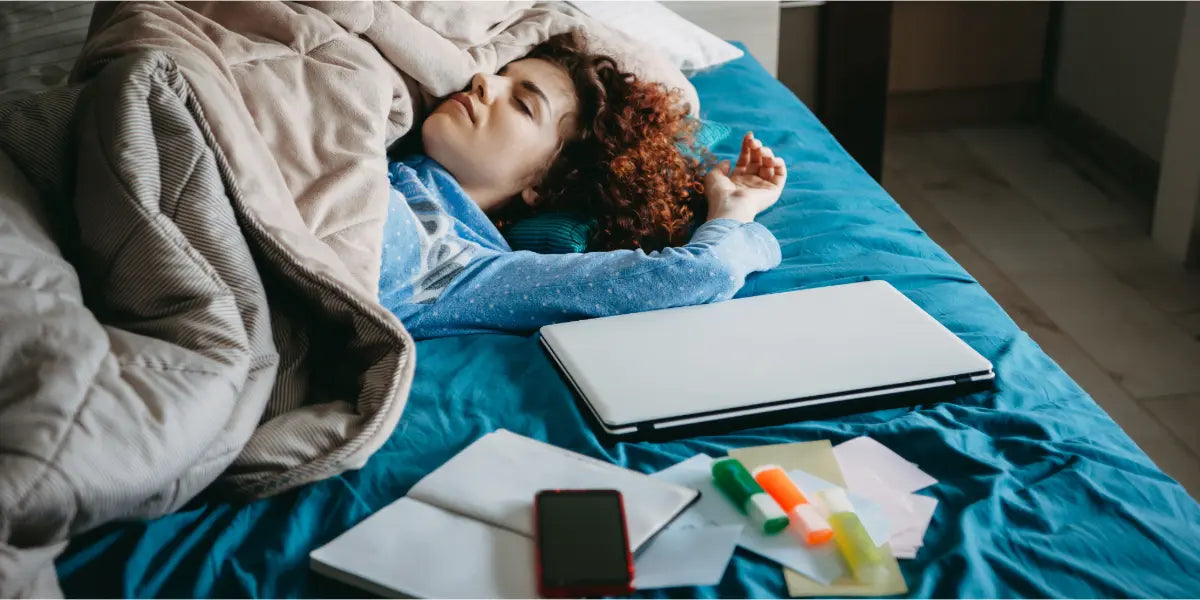Going to bed at the same time every night and waking up at the same time every morning can transform your sleep experience. This regular routine syncs your body clock and improves the quality of your rest. But how do you establish this habit and, more importantly, maintain it over the long term? It’s more than just setting a schedule; you need to create an environment that’s conducive to rest and adopt rituals to signal to your body that it’s time to wind down.
OPTIMIZE THE ROOM ENVIRONMENT
Slipping between the sheets after a long day can be pure bliss, but that pleasure can quickly turn into a nightmare if your mattress is uncomfortable. Few things impact the quality of your sleep as much as good bedding. The quality of your mattress is therefore an essential element in feeling comfortable and sleeping well. Imagine spending an entire night looking for the ideal position without ever finding it... tiring, right? A comfortable mattress doesn't just make you want to fall asleep ; it's essential for ensuring restful sleep and good health in the long term.
To help you fall asleep quickly, your bedroom environment should be conducive to relaxation. Make sure the temperature remains ideal, around 18 degrees Celsius, as too much heat or cold can disrupt your sleep.
An often overlooked but crucial aspect is background noise. Using continuous noise, such as white noise or the sound of waves, can help mask sudden, disruptive noises. Studies have shown that this type of noise improves sleep quality by reducing sleep onset latencies and preventing frequent awakenings.
Lighting plays a major role in sleep quality . Encourage natural light during the day and reduce exposure to artificial light in the evening. Blackout curtains can block outside lights and improve your nighttime environment. Also consider using dim lights in the evening to signal to your body that it’s time to wind down.
Finally, don't forget to keep your bedroom clean and tidy. A cluttered space can generate stress and anxiety, making it difficult to fall asleep. A serene and well-organized atmosphere promotes a calm mind, ready to dive into a restful sleep.
LIMIT SCREEN USE BEFORE BEDTIME
Blue light from TV, computer, and cell phone screens can disrupt the production of melatonin, the sleep hormone. By reducing exposure to these screens at least an hour before bedtime, you will allow your brain to naturally prepare for sleep. You can opt for more relaxing activities like reading a book, taking a warm bath, or practicing relaxation techniques.
There are also apps and settings on most devices that allow you to filter out blue light or adjust brightness based on the time of day . By enabling these features, you can reduce the negative impact screens have on your sleep. Small changes, such as switching to night mode or using filtering glasses, can make a big difference.
If you can't seem to get away from your electronics before bed, try setting an alarm to remind you to turn them off or put them away. It's also beneficial to keep devices out of the bedroom to create an environment that's conducive to rest. By following these tips, you'll increase your chances of falling asleep faster and getting a restful night's sleep.
SPORT
Sports and physical exercise play a fundamental role in the quality of your sleep. By moving regularly, you allow your body to release endorphins and reduce stress. As a result, this makes it easier to fall asleep quickly and improves the overall quality of your sleep. However, it is crucial to note that the time of day you exercise can have an impact. For example, intense exercise right before bed can prevent you from relaxing.
So when is the best time to exercise? Experts generally recommend finishing any vigorous physical activity at least three hours before bed. A good option is to exercise in the morning or late afternoon. Not only will this help you feel more energized during the day, but it will also promote faster and more peaceful sleep at night.
If you don't have time for a long workout, don't worry! Even a short session, like walking or cycling for 20 to 30 minutes, can make a big difference. The main idea is to maintain some regularity so that your body can benefit as much as possible from the positive effects on sleep.
TRY MEDITATION AND RELAXATION
Meditation and relaxation techniques can greatly improve the quality of your sleep. Start with deep breathing exercises, where you inhale slowly through your nose, filling your lungs for four seconds, then exhale gently through your mouth for six seconds. Repeat this cycle several times to calm your mind and relax your body.
Guided meditation: Using guided meditation apps or videos can also be beneficial. These voice guides guide you through calming visualizations and relaxation exercises, helping you release tension built up during the day.
Mindfulness practice: Taking a few minutes to sit quietly and focus on the present moment, accepting without judgment the thoughts that come to your mind, can help reduce the stress and anxiety that often disrupt sleep.
By incorporating these techniques into your evening routine, you can create a mental environment that is conducive to deep, restful sleep. Remember that just like the body, the mind needs to relax before it can truly fall asleep.
THE 4-7-8 BREATHING METHOD
The 4-7-8 breathing method is a simple yet powerful technique to calm the mind and relax the body. It is especially helpful for those who have trouble falling asleep quickly. Here's how to practice it:
- Inhale through your nose for 4 seconds.
- Hold your breath for 7 seconds.
- Exhale slowly through your mouth for 8 seconds.
Repeat this cycle at least three times, or until you feel your body relax and your mind become calmer. This method helps slow your heart rate and release physical tension, promoting a state of relaxation that prepares your body for sleep.
Followers of this technique often find that it helps reduce anxiety and promote better quality sleep. So, by incorporating 4-7-8 breathing into your nighttime routine, you can improve your chances of falling asleep faster and enjoying restful sleep.
THE POWER OF SOOTHING SOUNDS
Soothing sounds can play a crucial role in helping you fall asleep quickly. Whether it’s the gentle sound of falling rain or the relaxing babbling of a babbling brook, these sounds can calm the mind and prepare the body for a restful night’s sleep. Studies have shown that natural sounds, like ocean waves, significantly improve sleep quality and reduce nighttime awakenings.
For example, research by Williamson found that ocean sounds significantly improved wakefulness scores on the Richards-Campbell Sleep Questionnaire.
Additionally, white noise is also very effective. It masks disturbing environmental sounds and creates a constant sound that can help reduce sleep interruptions. White noise generating devices, as well as mobile apps, are readily available and can be a nice addition to your nighttime routine.
It's also interesting to note that some researchers, like Messineo and colleagues, have found that exposure to continuous noise before your usual bedtime can improve sleep quality. This suggests that incorporating soothing noise into your evening routine can speed up falling asleep and improve sleep continuity.
TAKE A HOT BATH BEFORE GOING TO BED
A warm bath before bed can be a great way to relax. The heat helps lower your internal body temperature, which naturally prepares your body for sleep. You can add soothing essential oils like lavender or chamomile for extra relaxation.
The hot bath ritual not only induces a state of calm, but it also helps create a clear break between the activities of the day and bedtime. By dedicating about fifteen minutes to it, you give your body and mind the opportunity to disconnect from daily stresses.
It is important to time this bath so that it is neither too early nor too late; ideally, take it about an hour before going to bed. This gives your body the time it needs to gradually lower the temperature and induce a faster and deeper sleep.
Try to think of it as a special time, just for you. Why not read a book or listen to some soothing music to maximize the relaxing effects of this simple, yet effective, nighttime ritual?
AVOID CAFFEINE AND HEAVY MEALS IN THE EVENING
In addition to disrupting your deep sleep, caffeine can increase the time it takes to fall asleep. Try to reduce or, better yet, eliminate all caffeine consumption after 2 p.m. This includes not only coffee, but also caffeinated teas and even soda. Everyone reacts differently to caffeine, so finding the right balance may take some adjustment.
Heavy, fatty or spicy meals can also play a role. When you eat a large meal before bed, your body has to work hard to digest the food, which can disrupt your sleep. Instead, opt for a light dinner a few hours before bed. Foods like fish, vegetables and slow carbohydrates can be healthy and well-balanced choices.
Remember that alcohol, while it may initially make you sleepy, can disrupt natural sleep cycles later in the night. If you choose to drink, try to do so in moderation and well before bed.
Finally, keep in mind that consistency is key. Maintaining the same eating habits each night will help your body understand when it's time to get ready for sleep. These adjustments can go a long way toward reducing the time it takes to fall asleep and improving the quality of your sleep.






